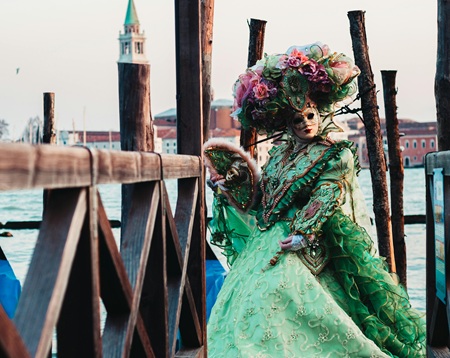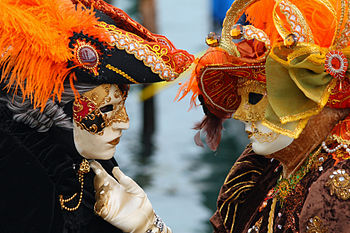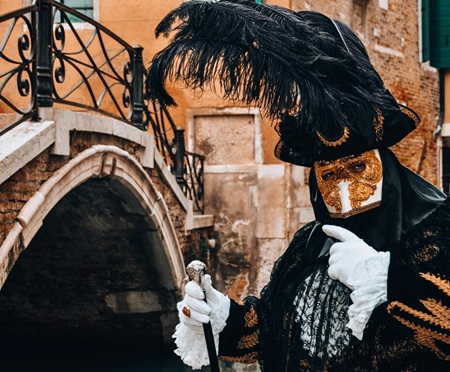A Carnevale ogni scherzo vale! Questo motto tradizionale ci da un’idea dello spirito che animava ed anima ancora il Carnevale in Italia.
Ti piace il Carnevale?
Scorri la pagina per proseguire l'attività... |
"A Carnevale ogni scherzo vale! " (At Carnival time anything goes!) This traditional saying reflects the spirit still fueling today’s Carnival in Italy.
Do you like Carnival?
Scroll down for more of the activity... |
|---|

Carnevale a Venezia
Share this activity:
"Carnevale (parte 1)" di Martin Stiglio
| Il Carnevale è quel periodo dell’anno che precede la Quaresima (che inizia il Mercoledì delle Ceneri). Quest’anno tale giorno cade il 5 marzo. Fino al giorno precedente, cioè il famoso Martedì Grasso, sfilate, divertimenti, mascherate, scherzi, canti e balli sono attivamente organizzati in molte città e paesi italiani con la partecipazione di tutta la popolazione. | Carnival is the period preceding Lent (which begins on Ash Wednesday). This year Ash Wednesday falls on March 5th and parades, amusements, masquerades, jests, songs, and dances are actively organized in many Italian cities and towns right up to the previous day, the famous Mardi Gras, and with the entire population’s participation. |
|---|---|
| In passato il Carnevale iniziava già con l’Epifania il 6 gennaio o al più tardi il 2 febbraio, con la ricorrenza della Candelora (Candlemas). Attualmente a Viareggio, Venezia ed in tante altre località italiane dove le feste carnevalesche, ancora molto sentite, contribuiscono ad attrarre turisti e visitatori, il periodo di baldoria dura circa due settimane e si conclude con puntuali roghi purificatori che, in segno di pentimento per gli eccessi compiuti, bruciano in effige Re Carnevale ed i suoi "indiavolati" aiutanti. | In the past, Carnival began as early as January 6th, the Epiphany or the latest, on February 2nd, with the celebration of Candlemas. Today, in Viareggio, Venice, and many other Italian cities where the celebration of Carnival, still strongly felt, contributes in attracting tourists and visitors, festivities go on for about two weeks and close with the customary purifying stakes where, in sign of repenting for the excesses committed, King Carnival and his "possessed" helpers are burnt in effigy. |
| Il nome Carnevale dato a questo periodo dell’anno trova tra i dotti spiegazioni abbastanza concordi. Come è noto durante la Quaresima, quale sacrificio penitenziale, era fatto a tutti assoluto divieto dalle autorità religiose di consumare vivande a base di carne. Com'è ancora possibile riconoscere nel termine "Carnilivari" usato in Sicilia, Carnevale deriva da "carnem levare"; periodo cioè in cui si da l’addio alla carne (ed ai piaceri della carne) e ci si prepara ai rigori quaresimali che per quaranta giorni precedono la Pasqua. | The name "Carnival", attributed to this time of year, finds the experts offering fairly similar explanations. For penance, religious authority absolutely forbade consumption of any meat based food during Lent, and as the term "Carnilivari", used in Sicily, can still attest to, "carnival" derives from "carnem levare", a phrase depicting a time dedicated to preparing for the rigours of Lent, a period encompassing the forty days preceding Easter and during which meat and the pleasures of the flesh are renounced. |
Carnevale a Venezia

| Come per ogni altra tradizione popolare italiana è tuttavia facile riconoscere in essa l’eco delle feste dell’antica Roma. In questo caso quelle connnesse con le celebrazioni dei riti di Saturno, i famosi "Saturnalia", durante i quali, in occasione del solstizio d’inverno, era permesso al popolo ogni licenza. Anche allora, con evidenti richiami ad antichissimi riti propiziatori mediterranei dell’abbondanza e della fertilità, il Re dei Saturnali o Re della Baldoria veniva, al culmine della festa, processato, condannato e bruciato in effige. L’eliminazione simbolica del male avrebbe garantito al popolo mondato da ogni peccato pace e concordia e messi abbondanti. | As with any other popular Italian tradition, it is nevertheless easy to recognize in this tradition the echo of celebrations from ancient Rome and in this case, those linked to celebrating the rituals of Saturn, the famous Saturnalia, during which, in occasion of the winter solstice, the people were permitted any liberty. Then too, in the tradition of very ancient Mediterranean propitiatory rites celebrating abundance and fertility, the King of the Saturnalia or the King of Festivities was, at the end of celebrations, brought to trial, sentenced, and burnt in effigy. The symbolic elimination of evil was to guarantee the people, cleansed of all sin, peace and harmony and a rich harvest. |
|---|---|
| In Italia, ma anche in gran parte del mondo cristiano, Carnevale nel corso dei secoli ha sempre avuto una forte carica dirompente per le consuetudini codificate ed ha sempre rappresentato il periodo in cui, seppure brevemente, le barriere sociali tra le classi e tra i sessi potevano essere impunemente abbattute, il potere sbeffeggiato ed ogni freno inibitore allentato alla ricerca senza remore del divertimento più sfrenato. Molte sono le abitudini e le tradizioni di Carnevale che non ce l’hanno fatta a sopravvivere fino ai nostri tempi o di cui rimane solo qualche traccia nelle moderne feste di Carnevale. A Venezia, Firenze ed altre città della Penisola, il periodo di Carnevale era temuto da tutti quelli che avevano qualche cosa di poco onorevole da nascondere. Succedeva spesso che persone mascherate, autoproclamatisi inviati di Re Carnevale, si recassero sotto le loro finestre per sbeffeggiarli pubblicamente senza pietà. Mariti traditi, bottegai disonesti con pesi e misure, osti usi ad annacquare il vino, preti e cappellani poco casti, avvocati e notai venduti, famosi ubriaconi e golosi all’eccesso, libertini impenitenti e donne di facili costumi, tutti erano messi alla berlina e costretti al silenzio dalla drammatica consapevolezza che ogni reazione non avrebbe che intensificato il ludibrio. | In Italy, as well as in the greater part of the Christian world, Carnival has always been, throughout the centuries, incredibly disruptive of set customs and has always been representative of a time, albeit short, when social barriers between the classes and between the sexes could be shamelessly ignored, power mocked and every inhibition released in the obstacle-free search for the wildest pleasures. There are many Carnival traditions and customs that have not survived through the ages or of which there is but a trace left in today’s celebrations. In Venice, Florence and other Italian cities, Carnival was a period feared by all who had something dishonourable to hide. Often, masked, self proclaimed envoys of King Carnival would stand beneath the windows of the guilty in order to publicly mock them without pity. Cheated husbands, dishonest shopkeepers, tavern owners used to watering down wine, priests and chaplains unobservant of their vow of chastity, corrupt lawyers and notaries, well known drunkards and gluttons to the extreme, confirmed libertines and loose women, all were subjected to scorn and forced to keep silent, aware that any reaction would only intensify the ridicule. |
| La maschera che i "messi" di carnevale indossavano, e l’anonimità che garantiva, assicurava loro l’impunità dalle vendette dei pubblici zimbelli; a molti permetteva però altre licenze e libertinaggi che soprattutto nelle repressive società del passato erano impensabili durante tutto il resto dell’anno senza correre il rischio di gravi sanzioni. Ma del rapporto tra il Carnevale e le maschere vale la pena di parlarne più diffusamente. | The anonymity guaranteed by the mask worn by the Carnival messengers, ensured safety from vengeance on the part of those publicly scorned; for many, however, it also allowed liberties and freedoms, otherwise inconceivable during the rest of the year without the risk of heavy sanctions, particularly within the repressed societies of the past. The relationship between Carnival and masks, however, deserves a more ample discussion. |
| Continua | To be continued |








